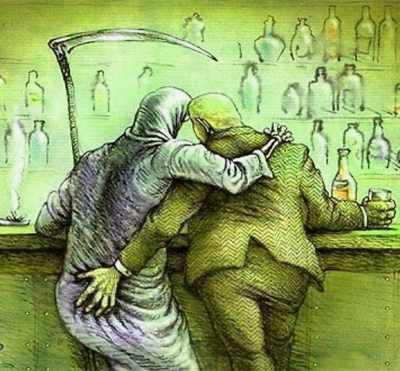
Alcoholism is rightfully considered one of the most serious problems of modern society, since the rate of spread of this disease increases every year. Constant advertising of alcoholic beverages and the availability of alcohol play a negative role, because it contributes to the spread of alcohol addiction among the population. "Advertising" has a particularly negative effect on teenagers, since everything forbidden always attracts. Youth alcoholism is a common phenomenon. In order for a person to get rid of the irresistible desire to drink alcohol, he must make a huge effort.

It is generally accepted that alcoholism is a disease caused by frequent consumption of alcoholic beverages and characterized by the appearance of a strong addiction to alcohol. It is classified as one of the types of drug addiction due to the fact that alcohol acts on the central nervous system like a drug. Due to long-term and intense abuse of alcohol, characteristic changes begin in the internal organs, so this fact is also classified as a symptom of alcoholism.
Any disease should be treated by a specialist. In this case, you should contact a psychiatrist-narcologist, since alcoholism is a serious problem that causes psychiatric and physical changes in the body. Most often, it is impossible to cope with this disease on your own, especially when it comes to the second and third stages of alcoholism. As a result, a timely visit to a doctor will help restore health and eliminate addiction.
Recently, all causes of alcohol addiction are divided into three large groups:
One of the most important points is considered to be the presence of a genetic predisposition to alcoholism, which occurs due to the occurrence of a mutation in the genes. As a result, a person with such changes in the chromosomes becomes an alcoholic much faster than others. Since a huge number of people have begun to suffer from alcoholism in recent decades, the probability of having children with an existing predisposition is very high. However, the presence of such a cause of alcoholism is not mandatory for its occurrence, since upbringing and social status are of great importance.
In addition to genetic predisposition, physiological factors include a person's health. With some diseases related to the nervous system, metabolism or liver problems, alcoholism occurs faster. Psychological changes in an alcoholic are most often present from the onset of the disease. A person who abuses alcohol often experiences depression and anxiety, has manic personality changes. Alcoholism and its consequences are terrible in psychological terms, since a person's personality is greatly degraded. Many people begin to "apply" to the bottle out of despair, others believe that alcohol gives them the opportunity to relax after a working day. Together, this causes regular alcohol consumption, which in the future will lead to addiction.
The socio-economic factor is the conditions in which a person exists. Depending on the environment, a person is either inclined to drink alcohol or not. Upbringing, traditions and family values ??affect the way a person relaxes and solves problems. If he has seen a negative example, that is, alcoholism in the family, the likelihood of addiction increases significantly. This is due to the fact that the fear of drinking alcohol disappears. If my parents could, then I can too - this is what most young people think when it comes to alcohol and cigarettes.
There are two forms of addiction - psychological and physical. The first occurs due to the effect of alcohol on the central nervous system, the second - due to the inclusion of ethanol in the metabolism. Alcoholism develops gradually, which depends on the frequency of use and the amount of alcohol drunk. In order to diagnose pathological addiction to alcohol, the doctor evaluates four signs:
In order to understand the severity of the condition, a psychiatrist-narcologist always evaluates the signs of alcoholism. The most important is addiction to alcohol, that is, an irresistible desire to drink it regardless of the situation. Doctors also distinguish three stages of alcoholism:
Irritability, high blood pressure, shaking hands, eyelids, increased heart rate, insomnia, vomiting after eating or drinking, not after alcohol, appear. In addition to physical symptoms, psychosis with hallucinations may begin. The condition is extremely dangerous for both the alcoholic himself and those around him. In order to prevent such severe symptoms, the alcoholic continues to drink alcohol, which leads to binge drinking. The consequences of alcoholism are still reversible, but only if all treatment conditions are met. Alcoholics can be at this stage for a very long time, sometimes until the end of life.
The main point in the treatment of alcoholism is a complete abstinence from alcohol for life, since even a single use of alcohol returns the alcoholic to his previous path. At the beginning of treatment, special attention is paid to eliminating withdrawal symptoms and alleviating alcohol dependence. To relieve alcohol intoxication, drugs are used that increase metabolism and remove ethanol from the body. Alcoholism and its consequences lead to the fact that it is extremely difficult to limit yourself to drug treatment alone. Alcoholics need intensive psychotherapy, since stable remission is possible only with full treatment.
In order to assess the seriousness of such a problem as chronic alcoholism, it is necessary to understand the social damage. Due to addiction to alcohol, families break up, sick children are born, who in the future may also become alcoholics. The number of crimes committed due to intoxication or in order to get alcohol is steadily increasing. Due to the prevalence of alcoholism, the general intellectual level of society decreases, which leads to the degradation and disappearance of cultural values. Due to health problems, the number of the working population decreases. The consequences of alcoholism are terrible not only for the person himself. They affect society and worsen the genotype of the entire nation. Therefore, we must focus on the prevention of this terrible disease, and not on its treatment.